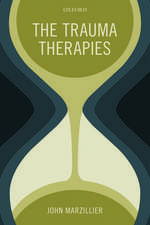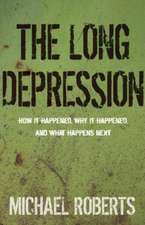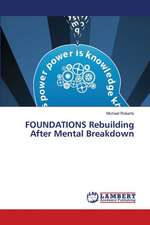Handbook of Evidence-Based Therapies for Children and Adolescents: Bridging Science and Practice: Issues in Clinical Child Psychology
Editat de Ric G. Steele, T. David Elkin, Michael C. Robertsen Limba Engleză Hardback – 10 dec 2007
Several EBT options, both proved and promising, are offered for each covered disorder and are bolstered by case examples, tables, and reference lists. Features include chapters on implementation issues such as diversity, family treatment, assessment strategies, and community settings, and step-by-step guidance for the researcher looking to gather empirical support for therapies.
With comprehensive coverage provided by numerous leading experts in the field, this volume covers the broadest range of disorders over the widest pediatric-adolescent age range, including:
- Behavioral disorders, ADHD, aggression, bullying.
- Phobias, panic disorders, school refusal, and anxiety.
- Autism and pervasive developmental disorders.
- Depression, mood disorders, and suicidal behavior.
- Alcohol and drug abuse.
- Eating disorders and obesity.
- PTSD.
Din seria Issues in Clinical Child Psychology
- 5%
 Preț: 1346.28 lei
Preț: 1346.28 lei - 5%
 Preț: 1902.43 lei
Preț: 1902.43 lei - 18%
 Preț: 930.17 lei
Preț: 930.17 lei - 18%
 Preț: 1794.23 lei
Preț: 1794.23 lei - 15%
 Preț: 634.18 lei
Preț: 634.18 lei - 18%
 Preț: 1797.94 lei
Preț: 1797.94 lei - 18%
 Preț: 1103.69 lei
Preț: 1103.69 lei - 5%
 Preț: 1415.34 lei
Preț: 1415.34 lei - 5%
 Preț: 1292.08 lei
Preț: 1292.08 lei - 18%
 Preț: 1787.89 lei
Preț: 1787.89 lei - 18%
 Preț: 988.47 lei
Preț: 988.47 lei - 5%
 Preț: 1400.44 lei
Preț: 1400.44 lei - 15%
 Preț: 632.73 lei
Preț: 632.73 lei - 5%
 Preț: 705.04 lei
Preț: 705.04 lei - 5%
 Preț: 1107.53 lei
Preț: 1107.53 lei - 15%
 Preț: 579.34 lei
Preț: 579.34 lei - 5%
 Preț: 364.56 lei
Preț: 364.56 lei - 18%
 Preț: 931.26 lei
Preț: 931.26 lei - 5%
 Preț: 706.62 lei
Preț: 706.62 lei - 5%
 Preț: 1408.70 lei
Preț: 1408.70 lei - 5%
 Preț: 1108.79 lei
Preț: 1108.79 lei - 5%
 Preț: 2101.22 lei
Preț: 2101.22 lei - 18%
 Preț: 1220.55 lei
Preț: 1220.55 lei - 18%
 Preț: 713.24 lei
Preț: 713.24 lei - 18%
 Preț: 1209.11 lei
Preț: 1209.11 lei - 18%
 Preț: 1804.75 lei
Preț: 1804.75 lei - 18%
 Preț: 2068.09 lei
Preț: 2068.09 lei - 18%
 Preț: 1628.94 lei
Preț: 1628.94 lei - 18%
 Preț: 2073.33 lei
Preț: 2073.33 lei - 5%
 Preț: 1343.45 lei
Preț: 1343.45 lei
Preț: 951.51 lei
Preț vechi: 1160.38 lei
-18% Nou
Puncte Express: 1427
Preț estimativ în valută:
182.13€ • 190.97$ • 150.48£
182.13€ • 190.97$ • 150.48£
Carte tipărită la comandă
Livrare economică 29 ianuarie-12 februarie 25
Preluare comenzi: 021 569.72.76
Specificații
ISBN-13: 9780387736907
ISBN-10: 0387736905
Pagini: 585
Ilustrații: X, 586 p.
Dimensiuni: 178 x 254 x 34 mm
Greutate: 1.18 kg
Ediția:2008
Editura: Springer Us
Colecția Springer
Seria Issues in Clinical Child Psychology
Locul publicării:New York, NY, United States
ISBN-10: 0387736905
Pagini: 585
Ilustrații: X, 586 p.
Dimensiuni: 178 x 254 x 34 mm
Greutate: 1.18 kg
Ediția:2008
Editura: Springer Us
Colecția Springer
Seria Issues in Clinical Child Psychology
Locul publicării:New York, NY, United States
Public țintă
Professional/practitionerCuprins
Establishing the Need and Criteria for Evidence-Based Therapies.- Evidence-Based Therapies for Children and Adolescents: Problems and Prospects.- Empirically Supported Treatments and Evidence-Based Practice for Children and Adolescents.- Methodological Issues in the Evaluation of Therapies.- Evidence-Based Therapies: Translating Research into Practice.- Evidence-Based Therapies for Specific Disorders or Conditions.- Psychosocial Treatments for Phobic and Anxiety Disorders in Youth.- Panic Disorder in Adolescents.- Evidence-Based Treatment of Pediatric Obsessive-Compulsive Disorder.- Interventions for Posttraumatic Stress in Children and Adolescents Following Natural Disasters and Acts of Terrorism.- Mood Disorders in Childhood.- Empirically Supported Psychotherapies for Adolescent Depression and Mood Disorders.- Evidenced-Based Therapies for Adolescent Suicidal Behavior.- Evidence-Based Treatments for Attention-Deficit/Hyperactivity Disorder (ADHD).- Evidence-Based Therapies for Oppositional Behavior in Young Children.- Treating Conduct Problems, Aggression, and Antisocial Behavior in Children and Adolescents: An Integrated View.- Components of Evidence-Based Interventions for Bullying and Peer Victimization.- Pain and Pain Management.- Evidence-Based Treatments for Children with Chronic Illnesses.- Evidence-Based Therapies for Enuresis and Encopresis.- Evidence-Based Therapies for Children and Adolescents with Eating Disorders.- Evidence-Based Therapies for Pediatric Overweight.- Evidence-Based Therapies for Autistic Disorder and Pervasive Developmental Disorders.- Evidence-Based Treatment for Children with Serious Emotional Disturbance.- Evidence-Based Approaches to Social Skills Training with Children and Adolescents.- Evidence-Based Treatments for Adolescent Substance Use Disorders.- Implementation Issues.- Dissemination of Evidence-Based Manualized Treatments for Children and Families in Practice Settings.- Client, Therapist, and Treatment Characteristics in EBTs for Children and Adolescents.- Implementing Evidence-Based Treatments with Ethnically Diverse Clients.- Evidence-Based Therapy and Ethical Practice.- Adoption of Evidence-Based Treatments in Community Settings: Obstacles and Opportunities.- Evidence-Based Assessment for Children and Adolescents.- Graduate Training in Evidence-Based Practice in Psychology.- Emerging Issues in the Continuing Evolution of Evidence-Based Practice.
Recenzii
From the reviews:
"This book provides a review of the literature on treatments for various diseases and disorders specific to children and adolescents. It specifically focuses on therapies for children and adolescents with strong empirical support and is intended to deliver a thorough review and discussion of their uses in a wide range of diagnoses. Clinical psychologists are an obvious target for this book, but child psychiatrists and other mental health professionals will also find it relevant to their work. … superb resource for clinicians working with children." (Christopher J. Graver, Doody’s Review Service, September, 2008)
"Steele, Elkin, and Roberts ... continue this highly needed job of disseminating evidencebased therapies (EBTs) for children and adolescents with Handbook of Evidence-Based Therapies for Children and Adolescents: Bridging Science and Practice. ... a book for advanced students of applied psychology, such as graduate students in terminal master's or doctoral programs. This book is an excellent and sharp tool for every clinician (psychologist or psychiatrist) who is in search of bridging science and practice." (Marios Constantinou, Christiana Dipli and Maria Karekia, PsycCRITIQUES, Vol. 53 (49), December, 2008)
"This book provides a review of the literature on treatments for various diseases and disorders specific to children and adolescents. It specifically focuses on therapies for children and adolescents with strong empirical support and is intended to deliver a thorough review and discussion of their uses in a wide range of diagnoses. Clinical psychologists are an obvious target for this book, but child psychiatrists and other mental health professionals will also find it relevant to their work. … superb resource for clinicians working with children." (Christopher J. Graver, Doody’s Review Service, September, 2008)
"Steele, Elkin, and Roberts ... continue this highly needed job of disseminating evidencebased therapies (EBTs) for children and adolescents with Handbook of Evidence-Based Therapies for Children and Adolescents: Bridging Science and Practice. ... a book for advanced students of applied psychology, such as graduate students in terminal master's or doctoral programs. This book is an excellent and sharp tool for every clinician (psychologist or psychiatrist) who is in search of bridging science and practice." (Marios Constantinou, Christiana Dipli and Maria Karekia, PsycCRITIQUES, Vol. 53 (49), December, 2008)
Notă biografică
Ric G. Steele, Ph.D., ABPP, is an Associate Professor of Psychology and Applied Behavioral Science at the University of Kansas, in the Clinical Child Psychology Program. He earned his doctorate from the University of Georgia in clinical psychology, with a specialization in clinical child psychology, completed a clinical internship at the University of Tennessee (Memphis) Professional Psychology Internship Consortium, and completed a Post-Doctoral Fellowship at the St. Jude Children's Research Hospital (Memphis, TN). Dr. Steele is an associate editor for the Journal of Child and Family Studies, and is on the editorial boards of the Journal of Clinical Child and Adolescent Psychology and the Journal of Pediatric Psychology. He has published more than 40 journal articles and book chapters, and recently co-edited the Handbook of Mental Health Services for Children, Adolescents, and Families. Dr. Steele's research is concerned with the promotion of physical and mental health across a continuum of health risk categories including healthy children, children at risk for disease, and children with diagnosed medical conditions.
T. David Elkin, Ph.D., ABPP, is an Associate Professor in the Department of Psychiatry and Human Behavior and is the Director of the Clinical Psychology Residency and Post Doctoral Fellowship Program at the University of Mississippi Medical Center. He received his doctorate in clinical psychology from the University of Memphis, and completed a clinical internship at the University of Oklahoma Health Sciences Center, specializing in pediatric psychology. He then completed a post doctoral fellowship in pediatric psychology at the University of Oklahoma Health Sciences Center. Dr. Elkin is a reviewer for the Journal of Pediatric Psychology, Children’s Health Care, Pediatrics, and the Journal of Consulting and Clinical Psychology. He has published over 20 peer-reviewed articles and book chapters, and is interested in childrendiagnosed with medical conditions, childhood depression, and perceptions of risk in research participants.
Michael C. Roberts, Ph.D., ABPP, is Director of the Clinical Child Psychology Program at the University of Kansas. He graduated from Purdue University in clinical psychology with a specialization in clinical child psychology and interned at the University of Oklahoma Health Sciences Center. He has served as editor for the Journal of Pediatric Psychology, Children’s Health Care, and Children’s Services: Social Policy, Research, and Practice. He has authored and co-edited 16 books, including Handbook of Clinical Child Psychology, Handbook of Pediatric Psychology, Model Programs in Service Delivery in Child and Family Mental Health, Prevention of Problems in Childhood, Helping Children Cope with Disasters and Terrorism, Handbook of Research Methods in Clinical Psychology, and most recently, the Handbook of Mental Health Services for Children, Adolescents, and Families. Dr. Roberts has published close to 200 journal articles and book chapters. He currently is PI on a grant to evaluate an innovative intensive mental health program for children who are serious emotionally disturbed in public schools. His research interests have been focused on prevention, especially injury control, professional issues, psychotherapeutic outcomes research and program evaluation in clinical child and pediatric psychology. He has been president of the Society of Pediatric Psychology, the APA Section on Clinical Child Psychology, and the Council of University Directors of Clinical Psychology, and serves as a representative to the APA Council of Representatives.
T. David Elkin, Ph.D., ABPP, is an Associate Professor in the Department of Psychiatry and Human Behavior and is the Director of the Clinical Psychology Residency and Post Doctoral Fellowship Program at the University of Mississippi Medical Center. He received his doctorate in clinical psychology from the University of Memphis, and completed a clinical internship at the University of Oklahoma Health Sciences Center, specializing in pediatric psychology. He then completed a post doctoral fellowship in pediatric psychology at the University of Oklahoma Health Sciences Center. Dr. Elkin is a reviewer for the Journal of Pediatric Psychology, Children’s Health Care, Pediatrics, and the Journal of Consulting and Clinical Psychology. He has published over 20 peer-reviewed articles and book chapters, and is interested in childrendiagnosed with medical conditions, childhood depression, and perceptions of risk in research participants.
Michael C. Roberts, Ph.D., ABPP, is Director of the Clinical Child Psychology Program at the University of Kansas. He graduated from Purdue University in clinical psychology with a specialization in clinical child psychology and interned at the University of Oklahoma Health Sciences Center. He has served as editor for the Journal of Pediatric Psychology, Children’s Health Care, and Children’s Services: Social Policy, Research, and Practice. He has authored and co-edited 16 books, including Handbook of Clinical Child Psychology, Handbook of Pediatric Psychology, Model Programs in Service Delivery in Child and Family Mental Health, Prevention of Problems in Childhood, Helping Children Cope with Disasters and Terrorism, Handbook of Research Methods in Clinical Psychology, and most recently, the Handbook of Mental Health Services for Children, Adolescents, and Families. Dr. Roberts has published close to 200 journal articles and book chapters. He currently is PI on a grant to evaluate an innovative intensive mental health program for children who are serious emotionally disturbed in public schools. His research interests have been focused on prevention, especially injury control, professional issues, psychotherapeutic outcomes research and program evaluation in clinical child and pediatric psychology. He has been president of the Society of Pediatric Psychology, the APA Section on Clinical Child Psychology, and the Council of University Directors of Clinical Psychology, and serves as a representative to the APA Council of Representatives.
Textul de pe ultima copertă
Growing numbers of young people—some 10% to 20% of school-age populations—have mental health problems requiring intervention, and current policy initiatives identify evidence-based therapies as the most effective and relevant forms of treatment. By reviewing evidence-based treatments (EBTs) across a wide spectrum of conditions, the Handbook of Evidence-Based Therapies for Children and Adolescents: Bridging Science and Practice closes the gaps between children’s needs and services as well as those between research, training, and practice,
Several EBT options, both proved and promising, are offered for each covered disorder and are bolstered by case examples, tables, and reference lists. Features include chapters on implementation issues such as diversity, family treatment, assessment strategies, and community settings, and step-by-step guidance for the researcher looking to gather empirical support for therapies.
With comprehensive coverage provided by numerous leading experts in the field, this volume covers the broadest range of disorders over the widest pediatric-adolescent age range, including:
Several EBT options, both proved and promising, are offered for each covered disorder and are bolstered by case examples, tables, and reference lists. Features include chapters on implementation issues such as diversity, family treatment, assessment strategies, and community settings, and step-by-step guidance for the researcher looking to gather empirical support for therapies.
With comprehensive coverage provided by numerous leading experts in the field, this volume covers the broadest range of disorders over the widest pediatric-adolescent age range, including:
- Behavioral disorders, ADHD, aggression, bullying.
- Phobias, panic disorders, school refusal, and anxiety.
- Autism and pervasive developmental disorders.
- Depression, mood disorders, and suicidal behavior.
- Alcohol and drug abuse.
- Eating disorders and obesity.
- PTSD.
Caracteristici
Covers a wider range of disorders and age ranges than competitor volumes Includes specific information on the processes of developing empirical support for therapies (which is of benefit to clinical researchers) Includes chapters on the implementation of EBTs in applied settings Clearly and concisely translates research findings into clinical practice

















